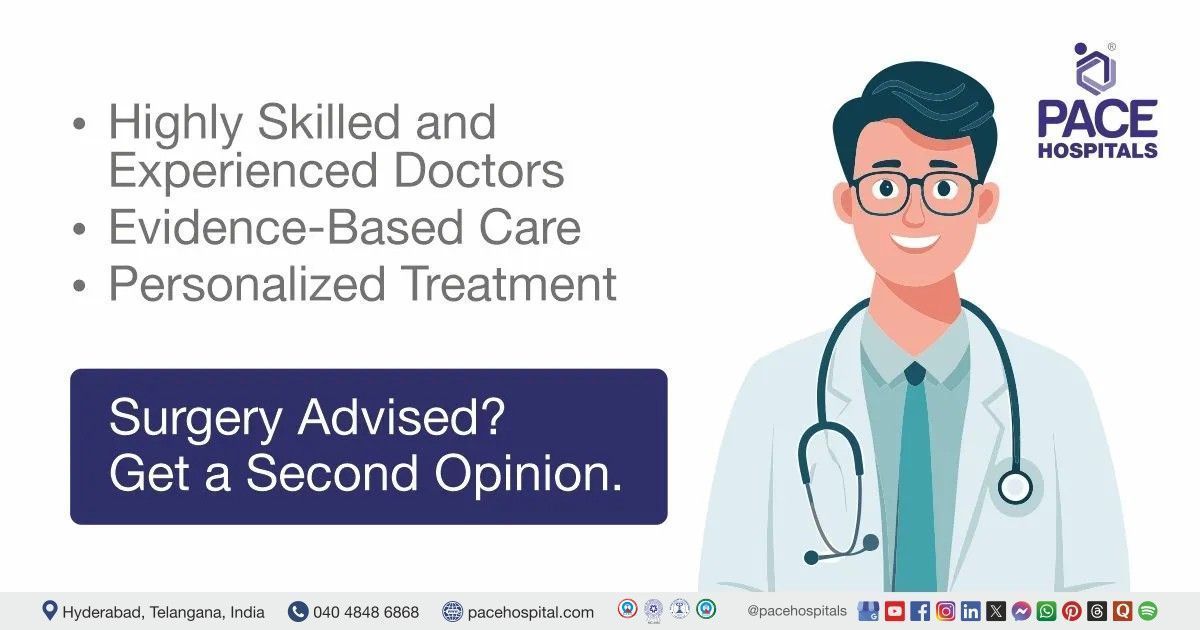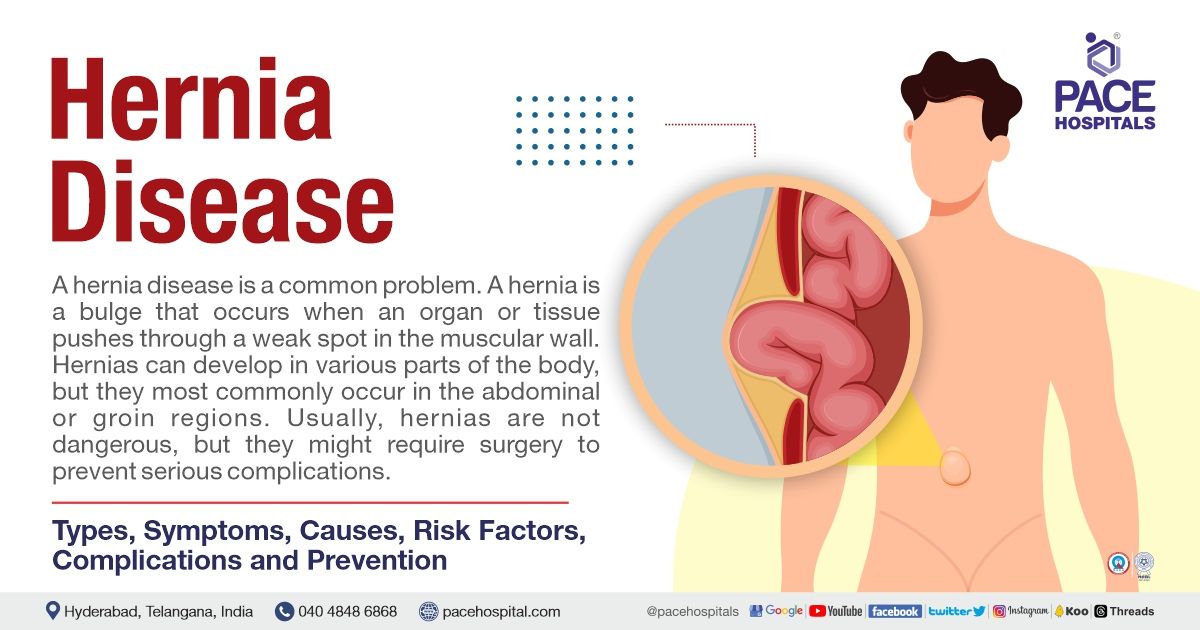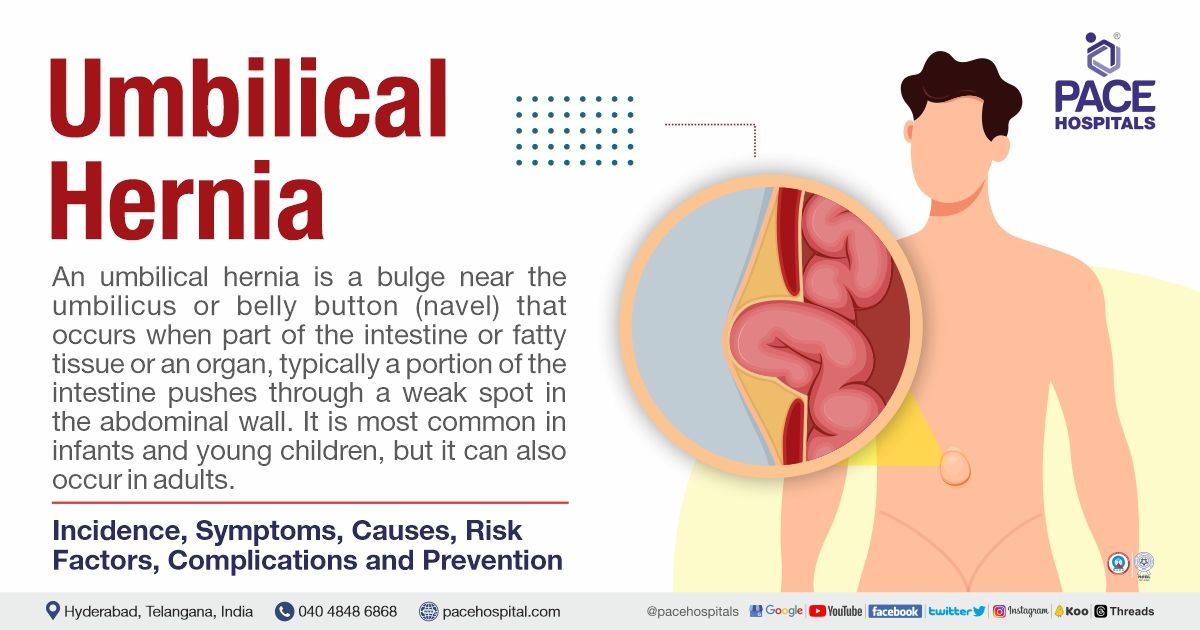Best Hernia Doctors in Hyderabad for Advanced Diagnosis and Treatment
PACE Hospitals
✅ Recommended by 9,452 Happy Patients. Get hassle-free appointments with hernia specialist doctor.
Dr. CH Madhusudhan
MBBS, MS - General Surgery (Osmania Medical College, Hyderabad, Telangana), FRCS (UK), MCh - Surgical Gastroenterology / G.I. Surgery (AIIMS, New Delhi), Liver Transplantation (USA)
Experience : 29+ years
Senior Surgical Gastroenterologist, Bariatric and Metabolic Surgeon, GI and HPB Oncologist, Liver Transplant Surgeon
Specialist
Specialist in Hernia Treatment, Surgical Gastroenterology, Advanced Laparoscopic Surgery, Minimally Invasive Hepato-Pancreato-Biliary (HPB) Surgery, Transplant Surgery, Upper GI Surgery, Abdominal Wall Reconstruction, Robotic Surgery, GI Oncology, Bariatric (Weight Loss) Surgery.
Expertise
Gastrointestinal Surgeries for Upper Gastrointestinal (GI) Diseases
- Esophagus: Esophagectomy for esophageal cancer, Nissen fundoplication for anti-reflux surgery, Laparoscopic Heller procedure (cardiomyotomy) for achalasia cardia
- Stomach: Vagotomy for peptic ulcer disease, Endoscopic sleeve gastroplasty (ESG) for bariatric weight loss, Endoscopic gastric balloon for bariatric weight loss
- Hernia Repair: Robotic and laparoscopic (minimally invasive) surgery for inguinal hernia, femoral hernia, umbilical hernia, paraesopageal hernia, incisional hernia, epigastric hernia, hiatal hernia and parastomal hernia
- Small Intestine: Diverticular disease and diverticulitis surgery, Lower Gastrointestinal (GI) Diseases
- Colon: IBD surgery for Crohn's disease and ulcerative colitis, Laparoscopic/open rectal prolapse
- Rectum: Laparoscopic/open rectal prolapse
- Liver Diseases: Laparoscopic/open surgery for liver cancer, liver benign cysts, and infections, Liver transplantation
- Gallbladder and Bile Duct Diseases: Laparoscopic/open surgery for gallbladder stones, gallbladder cancer, bile duct stones, and bile duct cancer
- Pancreas Diseases: Laparoscopic and endoscopic cooperative surgery for chronic pancreatitis, necrotizing pancreatitis, pancreatic pseudocysts, pancreatic and duodenal cancer
- Bariatric/Metabolic Surgery: Sleeve gastrectomy, Endoscopic gastric balloon for bariatric weight loss, Mini gastric bypass, Gastric bypass (Roux-en-Y)
- Other: Venous shunt for portal hypertension
Consultation Details
Languages Spoken: English, Hindi, Telugu
Timing: Mon to Sat - 3 PM to 6 PM
Location: PACE Hospitals, HITEC City
Dr. Suresh Kumar S
MBBS, MS (General Surgery), M.Ch (Surgical Gastroenterology)
Experience : 14+ years
Surgical Gastroenterologist, Minimally Invasive GI Surgeon and Advanced Laser, Laparoscopic Surgeon
Specialist
Specialist in hernia treatment, gastrointestinal, pancreatic and hepatic diseases such as gastroesophageal reflux disease (GERD), piles, hemorrhoids, anal fistula, anal fissure hernias, chronic pancreatitis, hepatitis, non-alcohol-related fatty liver disease (NAFLD), colon and rectal cancer, appendicitis, bile duct stones etc.
Expertise
Laparoscopic cholecystectomy, laparoscopic common bile duct exploration (LCBDE), laparoscopic inguinal hernia and ventral hernia repair, laparoscopic fundoplication, laparoscopic hemicolectomy, laparoscopic low anterior resection, laparoscopic abdominoperineal resection, laparoscopic gastrectomy, stapled hemorrhoidectomy, laparoscopic appendectomy, bariatric surgery, lateral pancreaticojejunostomy, laser for piles, Whipple procedure (pancreaticoduodenectomy), hepatectomy, distal pancreatectomy etc. His special interest lies in diagnosing and treating gastroesophageal reflux disease and complex hernias, in addition to operating bariatric surgery for obesity.
Consultation Details
Languages Spoken: English, Hindi, Telugu
Timing: Mon to Sat - 9 AM to 6 PM
Location: PACE Hospitals, HITEC City
Dr. Prashanth Sangu
MBBS, MS (General Surgery), M.Ch (Surgical Gastroenterology)
Experience : 12+ years
Surgical Gastroenterologist, Laser and Laparoscopic Surgeon
Specialist
Surgical Gastroenterology, Hernia Surgery, HPB Surgery, Laparoscopic Surgery, and Cancer surgeries related to the Esophagus, Stomach, Small and Large intestine, Rectum, Liver, Gall bladder, Pancreas, etc.
Expertise
General and laparoscopic surgeries such as Laparoscopic fundoplication for GERD, Radical & Sleeve gastrectomy, Antrectomy, Splenectomy, Bariatric surgeries, Lap cholecystectomy, Laparoscopic common bile duct exploration (LCBDE), Frey's procedure, LPJ obstruction, Hepaticojejunostomy, Radical Cholecystectomy, Whipple's procedure (pancreaticoduodenectomy), Hepatectomy, Colectomy, Low anterior resection, APR (Laparoscopic abdominoperineal resection), Rectopexy (Rectal prolapse surgery), Laser for Piles and Hemorrhoids, Surgery for fistula in ano.
Consultation Details
Languages Spoken: English, Hindi, Telugu
Timing: Mon to Sat - 9 AM to 6 PM
Location: PACE Hospitals, HITEC City
Top Hernia Specialist Doctor in Hyderabad, India for Complete Hernia Care
PACE Hospitals is recognized for having some of the Top Hernia Specialist Doctors in Hyderabad, India, who provide dedicated care for patients with inguinal, umbilical, femoral, and incisional hernias. Our team of experienced surgical gastroenterologists and hernia specialists focuses on precise diagnosis and patient-oriented guidance, ensuring that every individual receives the attention and support they need.
When you meet our best hernia surgeons in Hyderabad, the evaluation usually includes a detailed physical examination and, when required, imaging tests such as an ultrasound or CT scan. These assessments help the doctor understand the type and severity of the hernia and explain the most appropriate next steps in a simple, reassuring way.
If you are looking for the best hernia specialist in Hyderabad, India, PACE Hospitals offers comprehensive care through a skilled team of general surgeons and surgical gastroenterologists. Our specialists prioritise patient comfort, provide clear explanations, and guide each person through the decision-making process with confidence.
Known for our expertise in gastrointestinal and general surgery, PACE Hospitals is home to some of the
Best Hernia Doctors in Hyderabad, India. For experienced specialists, dependable diagnostic support, and trusted clinical outcomes, many patients choose the
Best Doctors for Hernia Surgery in Hyderabad, India, at PACE Hospitals.
Frequently Asked Questions (FAQs) on Hernia
Who is the best hernia doctor in Hyderabad?
At PACE Hospitals, hernia treatment is provided by the best hernia doctors in Hyderabad, including Dr CH Madhusudhan, Dr Suresh Kumar S, and Dr Prashanth Sangu, who are experienced hernia specialists in diagnosing and managing inguinal, umbilical and abdominal wall hernias. When surgery is required, each doctor is regarded as the best hernia surgeon in Hyderabad, offering laparoscopic and minimally invasive hernia repair to ensure safe treatment and a smooth recovery.
What type of hernia is more likely to need emergency surgery?
When compared to other types of hernia, femoral and inguinal hernias are more likely to get medical emergency surgery. Femoral hernias are more prone to strangulate, leading to a blocked bowel or peritoneal inflammation. The inguinal hernia that can’t be moved back into the abdomen required immediate medical attention as it leads to strangulation. Always reach out to a hernia surgery specialist in Hyderabad, India in such cases for prompt care.
What is the success rate of hernia surgery?
Hernia surgery has got the highest success rate when performed by experienced surgeons using state-of the- art infrastructure. Reports of 90 – 99% success rates are common. In very minor cases, recurrence of hernias occurs due to mesh repairs. Many patients have seen excellent outcomes under the care of the best hernia doctors in Hyderabad, India, known for their precision and expertise.
Which doctor is best for hernia repair surgery in Hyderabad?
The best hernia surgeon in Hyderabad is usually a doctor who treats hernia cases regularly and has hands-on experience with both open and laparoscopic surgeries. A good hernia specialist is skilled at identifying the specific type of hernia and selecting the appropriate surgical approach based on the patient’s condition. At PACE Hospitals, patients are treated by experienced hernia doctors in Hyderabad who focus on careful evaluation, safe surgical practices, and follow-up care aimed at long-term recovery.
Which specialist doctor to consult for hernia?
An experienced surgical gastroenterologist can help to ensure hernia repair successful without complications. In most cases, a hernia can be treated by a general surgeon. However, in case of complex hernias, specialists such as surgical gastroenterologist may be required. Consulting a hernia surgery specialist or the best hernia doctors in Hyderabad, India at PACE Hospitals ensures expert care and long-term results.
When one should see a hernia specialist doctor?
A person should immediately visit a hernia specialist doctor if they find some or all of the below-mentioned symptoms:
- cannot push the painful bulge back inside
- The bulge or hernia becomes sore or firm with increasing pain
- The hernia changes colour to red purple or dark
- Sudden pain in the abdomen that quickly gets worse
- Nausea, fever, vomiting or bloating
- Difficulty passing the gas or stools
Timely consultation with the best hernia specialist in Hyderabad, India helps avoid complications.
What should one expect during a consultation with a hernia doctor?
When a person consults a hernia specialist doctor, the specialist will discuss medical history and then performs a physical examination. If required, he may order some imaging tests like abdominal ultrasound, CT scan or MRI to help with diagnosis. Upon confirmation of hernia, he will discuss the treatment options and answers the patient’s concerns or questions, if any. The specialist may then assess the patient’s general health and suitability for surgery. By the end of the session, the doctor will provide specific instructions on preoperative procedure. At PACE Hospitals, the best hernia doctors in Hyderabad, India ensure patients receive complete guidance throughout diagnosis and treatment.
What are the risks of untreated hernias?
Some individuals might think that as they are not experiencing any major or troubling symptoms, the hernia they have might not be a big problem. This viewpoint might lead them to believe that ignoring the hernia is the best approach.
However, untreated hernias can not only grow in size, but they can also become more difficult to manage, increasingly uncomfortable, and more painful. In the worst-case scenarios, they could even become life-threatening. It’s always advisable to consult a trusted hernia doctor or hernia specialist to prevent complications.
Is surgery the only option for hernia treatment?
It's important to remember that most of the times hernias do not go on their own. In such cases, a surgery might be required to repair hernia. While non-surgical options like wearing a corset, binder, or truss can provide some relief by exerting gentle pressure on the hernia and holding it in place, these methods are usually used for managing pain and discomfort before or instead of surgery. Consulting an expert hernia specialist doctor can help determine whether surgical or non-surgical treatment is suitable.
What are the different types of hernias?
The hernia occurs when tissue protrudes through a weakened area of muscle. Hernias commonly occur in the abdomen and groin. Some common types of hernias include inguinal, femoral, umbilical, incisional, epigastric, and hiatal hernias.
There are several types of hernias, including:
- Inguinal hernia occurs in the groin area
- Femoral hernia mainly affects women and occurs in the upper thigh
- Umbilical hernia occurs near the belly button, commonly seen in children
- Incisional hernia occurs in scar tissue from a previous surgical incision in the abdomen.
- Epigastric hernia occurs between the breastbone and belly button
- Hiatal hernia happens when the stomach portion pushes up through the diaphragm and into the chest.
How soon can one continue normal activities after hernia treatment?
Post-surgery for hernia treatment, one can slowly resume normal activities after feeling comfortable and decreasing in pain. Usually, one can return to work in 7-14 days. However, it is recommended not to go for strenuous physical activities for about 4-6 weeks. Recovery guidance from a hernia surgery doctor ensures a safe and steady return to daily life.
What is the difference between an inguinal hernia and a femoral hernia?
In general, the groin is where both femoral and inguinal hernias form. However, an intestine that bulges into or through the inguinal canal is called an inguinal hernia. The femoral artery, which runs from the abdomen to the groin and upper thigh, lies in the femoral canal, where a femoral hernia is an intestinal protrusion. If you’re unsure of the type you have, consult a hernia specialist doctor for proper diagnosis and treatment.
Can hernia surgery be done laparoscopically?
Hernias are commonly treated through laparoscopy, a minimally invasive surgical technique. During laparoscopic hernia repair, the surgeon makes three to four small incisions and uses a laparoscope equipped with a camera to guide the procedure. In some instances, mesh might be utilized to support the displaced tissues. Typically, a laparoscopic hernia repair takes around 1-2 hour to complete. For the best outcomes, it’s advisable to consult the
top hernia specialist doctor in Hyderabad, India with experience in laparoscopic procedures.
How common are hernias, and who is most at risk?
Hernias are common, and the type of hernia that's most common depends on a number of factors, including age, sex, and family history.
- Gender: Men are more likely to get hernias compared to women
- Family history: people with history of hernia in family are at high risk
- Being overweight or obese
- Pregnancy
- Chronic cough
- Constipation
How do one find the right a hernia specialist doctor for the treatment?
It's important to choose an experienced hernia surgeon who is familiar with the latest techniques and advanced technologies, as they can help minimize the risk of complications. He should be specialized in hernia repair and carry more experience and up-to-date knowledge. Other than these, medical infrastructure and financial transparency will be among the factors involved in choosing the right hernia surgeon. Many patients prefer consulting the
top hernia specialist in Hyderabad, India at PACE Hospitals for comprehensive hernia care.
Is laparoscopic hernia surgery suitable for everyone?
Laparoscopic hernia repair is a minimally invasive surgical procedure that is generally considered safe and effective. However, it may not be suitable for everyone. While it's a good option for many, certain factors may influence suitability. The suitability of this procedure depends on various factors such as the patient's overall health, the size and location of the hernia, any previous surgeries, and the patient's preference. An expert hernia specialist doctor can assess these factors and recommend the best approach.
Are men more likely to develop hernias than women?
Yes, men are more likely to develop hernias than women, especially inguinal hernias. This is because of men having wider inguinal canal than women. In general, men are eight times more prone to have a hernia in their lifetime than compared to women. Consulting a
good hernia doctor can help in early detection and prevention.
Do hernias run in families? Is there a genetic predisposition?
Regarding hereditary hernias, in general, there is no genetic transmission of hernias from parent to child. Some hernias, meanwhile, are congenital—that is, they exist from birth. There may be a genetic component to groin hernias, although a distinct inheritance pattern has not been found.
Can previous abdominal surgeries increase the risk of hernia formation?
Yes, having abdominal surgery increases the likelihood of developing a hernia, especially an incisional hernia. These happen when tissue or organs push through the opening left by the abdominal wall's improper closure following surgery. They are a particular kind of ventral hernia, usually affecting the front of the abdomen. If you’ve undergone prior surgeries, regular follow-ups with a
hernia best doctor can help in early detection.
Is laparoscopic surgery less painful than traditional open hernia surgery?
Yes, laparoscopic hernia surgery is usually less painful than traditional open hernia surgery. The benefits of laparoscopic hernia surgery not just are limited to being painless, but also the recovery is faster and scarring of the tissue is minimal, when compared to conventional open hernia surgeries. Many patients choose the
best hernia doctors in Hyderabad, India at PACE Hospitals for their expertise in minimally invasive procedures.
Is the recovery time shorter for laparoscopic hernia surgery compared to open surgery?
Yes, usually the recovery time is shorter for laparoscopic hernia surgery compared to open hernia surgery. In case of laparoscopic surgery, patient may go home on the same day of surgery and can return to their work involving light to moderate physical activity in 1-2 weeks. Whereas this recovery period is more in open surgery and might get 4-6 weeks of time to return to their normal work routine. This is why consulting the
best doctors for hernia surgery in Hyderabad, India ensures optimal recovery care.
What are the advantages of laparoscopic hernia surgery?
Laparoscopic hernia surgery carries multiple benefits compared to the open type surgeries as mentioned below:
- Smaller incisions
- Minimal pain
- Quick recovery
- Lesser duration of hospitalization
- Reduced infections risk
For comprehensive care, patients often trust the top hernia doctors in Hyderabad, India for advanced laparoscopic procedures.
Is laparoscopic hernia surgery more expensive than open surgery?
When it comes to cost of laparoscopic hernia surgery, due to its shorted hospitalization requirement, hospitalizations costs are less compared to open surgery. Laparoscopic surgery requires local anaesthesia in most cases, which is less expensive than open type surgeries. However, laparoscopic surgery involves specialized equipment like laparoscope and mesh etc. These could add on to overall cost compared to open hernia surgery, where simple instruments are used. To get a detailed cost estimate, consulting the
best hernia surgeon in Hyderabad, India is recommended.
Is laparoscopic surgery suitable for all types of hernias?
Laparoscopic surgery is suitable for inguinal hernias and recurrent hernias. However, the laparoscopic surgery isn’t recommended for all types of hernias, especially in the below mentioned conditions:
- Giant hernias that are irreducible
- Bleeding disorders
- Patients on blood thinner medications
- Patients who had lower abdominal surgery
- Patients with abdominal radiotherapy.
A hernia surgery specialist can help evaluate which approach is safest for you.
Can I have a laparoscopic hernia repair if I've had one before?
If you have had a hernia repair surgery before, you may still be a candidate for laparoscopic hernia surgery. In fact, laparoscopic surgery can be a good option for recurrent hernias, as it allows the surgeon to approach the hernia from a different direction than the original surgery. However, the decision to perform laparoscopic surgery for a recurrent hernia should be made on a case-by-case basis, taking into account the patient's medical history and the specifics of the hernia. Consulting the best doctors for hernia surgery at PACE Hospitals in Hyderabad, India helps ensure the best outcome for recurrent cases.
What is the cost of hernia treatment in Hyderabad?
The cost of hernia surgery in Hyderabad, Telangana, India, can vary from ₹70,000 to ₹1,25,000 (US$815 to US$1450), it is significantly based on factors such as, the type of surgery (open or laparoscopic or robotic), the use of mesh, and the hospital's facilities.
On average, open hernia repair (herniorrhaphy) might cost around ₹70,000. Laparoscopic hernia surgery with mesh repair is generally more expensive, ranging from ₹80,000 to ₹1,25,000 (US$925 to US$1450). The
best hernia doctors in Hyderabad, India can help you understand the costs and choose the best option suited to your medical and financial needs.
What our patients have to say
Experts Perspective
Related Articles


Why choose PACE Hospitals?
- A Multi-Super Speciality Hospital.
- NABH, NABL, NBE & NABH - Nursing Excellence accreditation.
- State-of-the-art Liver and Kidney transplant centre.
- Empanelled with all TPAs for smooth cashless benefits.
- Centralized HIMS (Hospital Information System).
- Computerized health records available via website.
- Minimum waiting time for Inpatient and Outpatient.
- Round-the-clock guidance from highly qualified super specialist doctors, surgeons and physicians.
- Standardization of ethical medical care.
- 24X7 Outpatient & Inpatient Pharmacy Services.
- State-of-the-art operation theaters.
- Intensive Care Units (Surgical and Medical) with ISO-9001 accreditation.
Share on
Request an appointment
Fill in the appointment form or call us instantly to book a confirmed appointment with our super specialist at 04048486868
Appointment request - health articles
Recent Articles


















